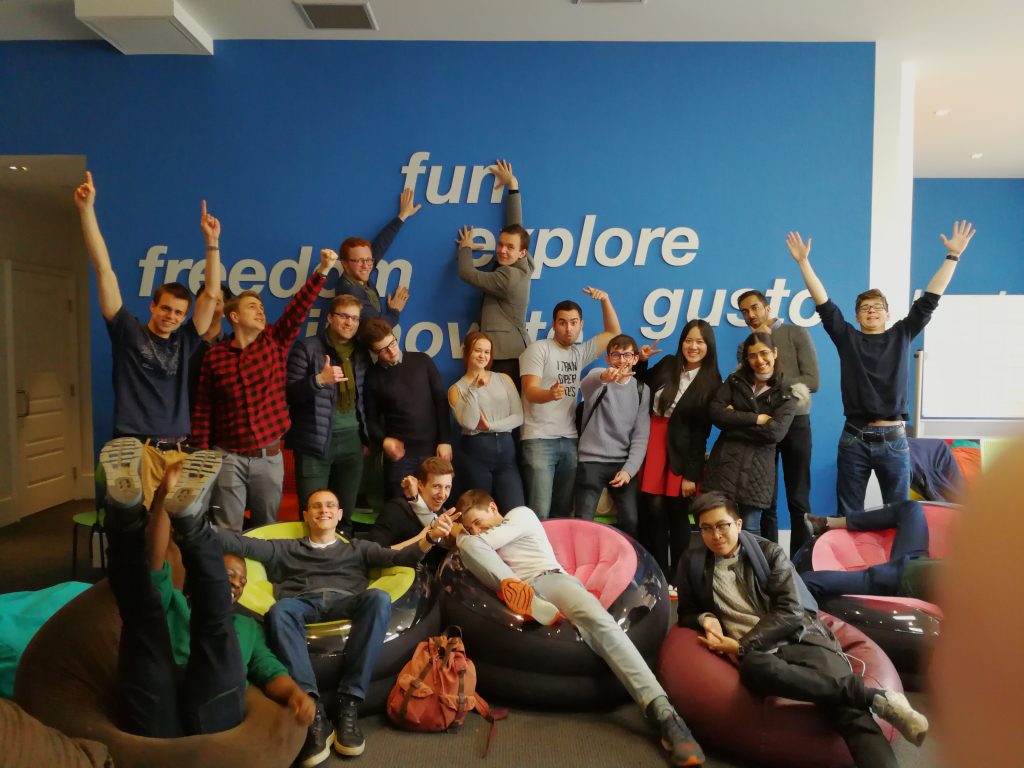In March 2017 I visited Silicon Valley with the student society Oxford Entrepreneurs. The Silicon Valley Trip is OE’s annual expedition to the San Francisco Bay Area, where a close-knit group of students get to meet with CEOs, mingle with founders, and tour the offices of a variety of companies different in size and start-up stage. We also visited some traditional and not so traditional universities and schools, as well as attending networking sessions with Angel Investors and Oxford alumni in the Valley.
I learnt a lot from the trip and thought it would be helpful to collate and share my thoughts. At each place we had a contact, often an Oxford alumnus, tell us their story, their company’s story, what they did as well as giving general advice and insight on tech entrepreneurship and working in the Valley.
Our first visit was to the campus of the world-dominating Google, where an Oxford alumni now working as a product manager showed us round.
Working for Google (at least as a tech person) is exactly as sweet as I’d heard. Their basic approach to employees is make life so easy, wonderful and comfortable that you can spend all your time working. If your work life is so great you’ll make it your whole life. This isn’t necessarily a bad thing if you love your work, but weirdly doesn’t appeal to me much. I guess because I don’t want to spend my entire waking life coding and quite like having a separation of work and life.
In terms of software development, the process and team structure was pretty unremarkable. Interestingly, quite a few roles, such as product manager, have basically no authority over engineers. This forces them to build consensus on a decision, which is often achieved by bringing data (unless you’re God as the adage goes). They have a higher than usual focus on quality control and the complicated production cycle lasts a whole year or so, but this isn’t surprising considering how many people use their products. There was also emphasis on post-mortems and learning from history with respect for owning up to mistakes. No moving fast and breaking things here. As someone whose life is basically run on Google’s offerings that was music to my ears.
Because of Google’s mahoosive scale weird things start to make sense. You can work on just a tiny component of one of Google’s smorgasbord of products but because that product is used by tens of millions of people every day you’ll have even more impact than building a whole product for even tens of thousands of users.
It’s important to remember that we the consumers aren’t Google’s customers but what they’re selling. Since Google’s general service is as an assistant to using the internet and their revenue stream is directly related to how much we use the internet it makes sense for them to do anything that increases that. This is why they provide so much software for free. Android exists just so Google is the default search engine. It’s also why they built Chromebook and will probably end up improving hard and software all the way down to the microchip level. Anything to make using the internet easier, cheaper and more widely available.
So they can give the entire internet infrastructure for free in developing countries as they’ll recoup the money in cat video watches. This is part of the reason why working there is so great. The vast majority of what their staff do is only indirectly related to their revenue so they don’t have any of the usual efficiency pressures and can instead just focus on creating awesome stuff.
Another aspect of Google’s scale is that they are massive supporters of a free and fair market despite having many almost monopolies. They want there to be an open playing field so that they can dominate on scale and product quality. They produce products 10x-100x better than the alternatives, are motivated to give them for free and have crazy cheap hardware costs due to their size. As long as the market is free they’ll win every time.
Talking about hardware at scale, one of my favourite tidbits was learning that Google deliberately bought faulty hardware back in the day. They designed the system to try running a process on a machine and if it wasn’t working divert it to one that was. That way they could spend ten times less on hardware but achieve the same performance as their competitors (because who else would be stupid enough to buy broken stuff?). Additionally, it made their system super stable as failure was an integral component of the design. Nassim Taleb would be so proud.
Due to Google being truly global they really concentrate on user experience (or “UX” for the cool kids). They want as little text as possible yet have to bear in mind that symbols mean different things in different countries (Instagram has problems with the heart button in conservative Islamic countries). They run in-house experiments watching people grabbed off the street (hopefully not actually kidnapped) use prototypes. They’re aware that only experimenting on San Franciscans creates a bias so the product managers have to travel to foreign offices all over to remain aware of different cultures.
One thing that made me chuckle at Google was an advert for a charity that gives suits to people who can’t afford one for a job interview. It was asking for Googlers to donate all of their business clothes as they’ll “never need to wear them ever again!”
Y Combinator
We were introduced to our first accelerator by Kat the director of outreach at YC. She talked a lot about startups in general as well as how to run an accelerator.
When looking at YC applicants they focus on the founders rather than the idea. Startups are really business experiments trying to fine-tune a product to a market and pivots are normal. So it’s far more important to have great, talented, hardworking people who have a good working relationship than a killer idea. The biggest killer of early stage startups is cofounders fighting, so the relationship needs to be like a healthy marriage.
The startup’s business model doesn’t need to be completely original but it does need to be a little different. They look for companies “with a secret”. She gave the example of a current participant that is almost directly copying Instacart but tuned for the nuances of the South American market, where Instacart doesn’t operate.
If you want to understand how YC works and their ethos you should just read every essay by Paul Graham, apparently. My takeaways were that the programme emphasises on focus rather than collaboration, which is what I’d expected. When a company is going through the programme the founders should only be doing two things: building product and talking to users. In fact one of the phrases that most stuck with me from the whole trip was “talk to your fucking users!“. Founders should be doing customer support themselves. “You don’t know best, the customer does and the only way to make a viral product is to learn from your users.”
The main focus of founders in the programme is metrics and increasing them exponentially. The metric doesn’t have to be revenues, particularly in a highly regulated area (they’ve had a supersonic jet builder go through the programme!), it could be increasing the number of Letters of Intent ten times each week. It just needs to increase and increase fast every week, nothing else matters.
When it comes to pitch day once again the emphasis is on focus. They do ‘vertebrae’ office hours where they reduce your entire business to its backbone: What are the 2-3 points about your business you need to get across to investors because you’re going to have only a couple of minutes?
The average investment in a company is $700k. However going through YC and getting funding is no guarantee of success, one YC alumni we met later at Slack said only 4% of his cohort were still running their startups as independent companies 5 years on. YC failures often get employed or bought (acquihired as I learnt the cool kids call it these days).
Kat claims the secret sauce that makes YC the most prestigious accelerator is their proprietary software. They have loads of tools for tracking and the like. They have a large dataset they use to improve the programme and help participants avoid pitfalls, as well as running experiments each cycle. Kat emphasised the importance of not over-learning from one datapoint though. They have their own social network for participants and alumni that allows participants to leverage the extended network. There’s nearly always someone who can, or knows someone who can, answer any question you might have, which sounds pricelessly useful.
One of my other major takeaways was that every single startup starts as a “shitshow”. They all look very impressive and slick on the outside but inside they’re basically constantly falling apart and only kept together with duct tape and determination. AirBnB very nearly died three times (the company, not the founders).
Interesting tidbits included that the average age of cofounders is 28-30 (which means it’s not all sickeningly young wunderkinds!). They also have non-profits go through the programme, as starting them really isn’t that different from starting a business and so many these days are heavily tech based (although it has to be said that technically most of the businesses are non-profits as well, boom tsch).
Finally YC is aware the effect tech disruption is having on society and the economy and they actually have a research arm now which is investigating things such as Universal Basic Income, which may be needed after software has eaten up the world.
Harj Taggar
We had dinner later in the trip with a former YC partner, Oxford alumni, Forbes 30 under 30, and all-round incredibly nice guy, Harj Taggar. He’s now building the recruitment platform TripleByte but he gave us loads of insight into YC and the general startup world.
YC started as an alternative to an internship with a bank or consultancy. It wasn’t really supposed to be that serious: “Spend a summer building something cool! Here’s $50k, go have fun!” (This chimes with a recurring theme in my personal reading recently: most financially successful things aren’t directly aiming to make money).
The valuation distribution of YC companies follows a strong power-law distribution; if you line up all of the YC companies according to their valuation then go down the line starting at the highest valued, then each company is worth all the ones worth to the left of it (i.e. worth less) combined.
Harj gave some quality advice for people wanting to get into startups. Work on something that’s a real problem. Plenty of startups are tackling things that are annoyances but not real problems. If you’re tackling a genuine issue you’ll have money thrown at you to fix it. Startup founders need to be able to either build a product or sell the shit out of it (and get rejected a lot (finally my dating history comes in use!)), nothing else matters really.
For career advice he recommended joining a fast growing startup with around 20ish employees. The best role is a generalist job position, which has different names in different companies e.g. ‘Head of Special Projects’. He didn’t recommend doing venture capital if you actually want to do startups as it has a limited learning curve and the top positions are reserved for people who’ve actually successfully exited. If you are going to do VC, do it for only a couple of years and use it as a way to find good startups to join.
When judging a startup to join it’s most important to look at the quality of the investors. Pay attention to transparency as this is a good proxy for honesty, which is integral in founders. In particular, check if the founders are upfront about your equity, e.g. what percentage you get of the total issued (as an aside never make financial decisions, e.g. house buying, based on equity). Also look at employee turnover, though not necessarily just numbers. Why are people leaving company? If loads are quitting then that’s a warning sign. If founders fire people for low competence thought it could be a good sign. You want to work with very talented people when things are so risky. You want to join a startup that’s got a rocket trajectory so must be growing and have traction. The search is very similar to the search of VCs.
It is very important to work on your network. Deliberately do hobbies and activities (or do them at a particular place) that expose you to the people you want to be exposed to.
Much like investment bankers are judged by their suit and watch, in the valley people are judge by their ability to think and communicate precisely and succinctly (I definitely noticed people spoke much faster there than the rest of the states).
Every role is becoming more quantitative, even traditionally soft skilled ones. Sales, marketing and HR all need data science these days. There are useful quantitative courses on Coursera on sales and growth marketing.
He gave us a reading list for homework as well:
- Paul Graham’s essays
- Marc Andreessen’s Why not to do a startup
- The book Surely You’re Joking, Mr. Feynman! Science has a lot of parallels with startups, in particular that insights are often accidental.
- A career advice lecture by Dr Richard Hamming You and Your Research
- A life advice lecture by Randy Pausch The Last Lecture: Really Achieving Your Childhood Dreams
All good things come in trilogies and this blog post is no different:
Part II – The e-mpire Strikes Back.
Part III – Revenge of the Silicon



